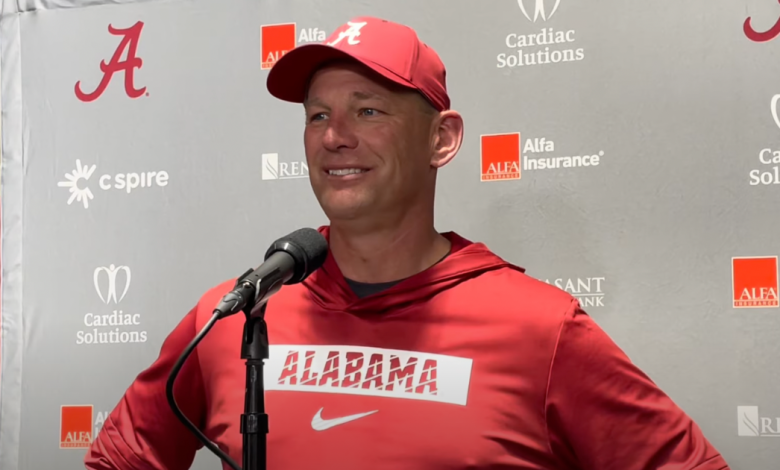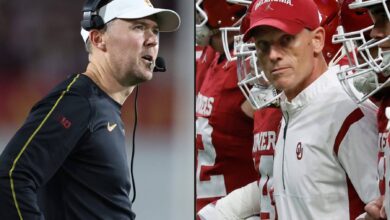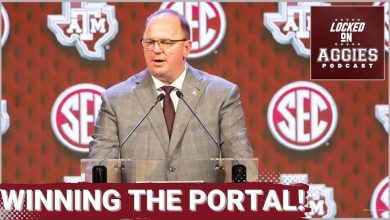Kalen DeBoer said he’s encouraged by Alabama’s roster stability after spring, noting the team’s direction feels right. He shared these thoughts while playing in the Senior Bowl Charity Classic.

Alabama head football coach Kalen DeBoer took a brief break from spring practices and team meetings to participate in the Senior Bowl Charity Classic, a lighthearted yet meaningful event that brings together current and former football figures for a day on the golf course in support of charity. Yet even in the calm setting of a golf tournament, DeBoer’s mind remained focused on his team — and the progress he’s seen this spring.
The 2025 Alabama football program, still adapting to new leadership following the retirement of Nick Saban, is beginning to resemble what DeBoer has envisioned since stepping into the massive shoes of one of college football’s all-time greats. After months of transition, recruiting, development, and cultural reshaping, DeBoer finally expressed a growing confidence in how the team is coming together. One of the biggest reasons? Roster stability — especially through the spring transfer portal window.
In an era of constant roster turnover due to the NCAA transfer portal and NIL-related movement, DeBoer and his staff pulled off something increasingly rare: They didn’t lose a single player to the spring portal.
“I Really Like the Direction”
Standing at the tee box during the Senior Bowl Charity Classic, DeBoer spoke candidly about the state of his Alabama program and the significance of maintaining his roster intact through a critical period of spring development.
“I really like the direction this team is going,” DeBoer said. “We’re starting to take real shape. A lot of guys have bought in, and for us to come through the spring without losing anyone to the portal — that says a lot.”
In today’s college football climate, players often leave programs post-spring if they don’t like their spot on the depth chart or see better NIL opportunities elsewhere. Yet at Alabama, DeBoer seems to have fostered a sense of purpose and buy-in that kept his roster together during this volatile window.
“I think it speaks to the culture we’re building,” DeBoer continued. “Our guys understand that this isn’t just a one-year deal or a quick-fix team. We’re building something that can last, and they want to be a part of that.”
Replacing a Legend, Building a New Identity
When Kalen DeBoer was announced as Nick Saban’s successor, he inherited the pressure of maintaining Alabama’s standard of national excellence — six national championships, countless NFL Draft picks, and a culture that expected greatness every year. But what makes DeBoer unique is his ability to blend respect for tradition with a fresh, player-first approach that resonates with today’s college athletes.
“I didn’t come in here trying to be Coach Saban. No one can be,” DeBoer said earlier this spring. “But what I can do is take what works — the discipline, the competitiveness, the attention to detail — and combine that with a modern approach to player development and relationships.”
That mindset has translated well to Alabama’s locker room. Veterans who considered transferring chose to stay. Young players bought into the new system. Even amid the expected growing pains of a new coaching regime, DeBoer has been able to stabilize the roster — and in doing so, give the 2025 team a real shot to contend in what promises to be a fiercely competitive SEC.
Why Roster Retention Matters More Than Ever
The value of keeping a team together can’t be overstated in today’s version of college football. With the NCAA’s rules allowing players to transfer once without sitting out, and NIL deals giving athletes financial incentive to move, spring often becomes a second recruiting season — this time focused on your own players.
Teams across the country lost starters and key depth pieces in the spring portal window. For Alabama to avoid that entirely under a first-year head coach is an impressive feat.
“It gives us consistency and chemistry going into the summer,” DeBoer said. “We don’t have to re-teach everything. The guys that went through spring ball are the same ones we’re bringing into the fall, and that continuity is going to be huge.”
That chemistry is especially important given the complexity of DeBoer’s offensive system and the changes on the defensive side of the ball as well. Every additional rep with the same personnel increases the chances of executing at a high level in September — and beyond.
Quarterback Leadership and Buy-In
Perhaps the most encouraging sign for DeBoer is the leadership that has emerged at the quarterback position. Returning starter Jalen Milroe, who blossomed into a dynamic playmaker last season, has fully embraced DeBoer’s system and has worked diligently to refine his passing mechanics and command of the offense.
“Jalen’s been outstanding,” DeBoer said. “He’s taken ownership of the offense. He wants to be great, and he’s doing everything in his power to make that happen.”
Milroe’s decision to stay at Alabama, despite opportunities elsewhere, was emblematic of the overall team mindset — stay, grow, and chase a championship under the new regime.
“I think when your quarterback is all-in, it sets the tone for everyone else,” DeBoer said. “That leadership spreads.”
Behind Milroe, young quarterbacks like Ty Simpson and Julian Sayin have also shown promise, with both demonstrating patience and a commitment to development instead of seeking immediate playing time elsewhere.
In a world where backup quarterbacks transfer at the first sign of being passed over, Alabama’s quarterback room is not just intact — it’s thriving.
Lessons From Spring Ball
Spring practice gave DeBoer and his staff a critical opportunity to assess talent, install new systems, and establish expectations for the fall. One of the biggest takeaways for DeBoer was the team’s willingness to compete and adapt.
“We pushed them hard this spring, and I was really impressed with how they responded,” he said. “Guys are competing every day. There’s no sense of entitlement, and that’s exactly what you want.”
He also pointed to several position groups that took major steps forward — including the offensive line, which is transitioning to a more versatile and aggressive blocking scheme, and the secondary, which responded well to the coaching of defensive backs coach Travaris Robinson, who stayed on from Saban’s staff.
“There’s a real energy around the team right now,” DeBoer noted. “You can feel it.”
Building Toward Fall Camp
With the spring phase complete, the focus now shifts to summer conditioning and preparation for fall camp. And for DeBoer, this is the time to lock in the leadership, culture, and standards that will carry Alabama through the grueling SEC schedule.
“Our message going into the summer is simple: don’t let up,” he said. “We’ve got something special here, but it’s not going to just happen. We’ve got to earn it every day.”
The coaching staff plans to use the next few months to further refine scheme details, solidify depth charts, and get younger players physically and mentally ready to contribute in the fall.
“We’re going to need everyone,” DeBoer said. “This conference is a grind. But I really like the guys we’ve got, and I love how they’re approaching it.”
A Look Ahead to the 2025 Season
The 2025 season will be a pivotal one for DeBoer. Alabama will be judged not only on wins and losses but also on how the team performs under a new regime in high-pressure games. Expectations remain sky-high — this is still Alabama — but the approach is evolving.
The SEC’s expanded format, including new additions like Texas and Oklahoma, will make the road tougher. Alabama has marquee matchups ahead, including games against Georgia, LSU, and a high-stakes early-season test against Wisconsin — DeBoer’s former Big Ten rival.
“Every week is a battle, but that’s why you come to Alabama,” DeBoer said. “You want to play on the biggest stage.”
If the spring is any indication, Alabama will be prepared — physically, mentally, and emotionally.
Final Thoughts from the Fairway
As DeBoer wrapped up his round at the Senior Bowl Charity Classic, he took a moment to reflect on the journey so far.
“It’s been a whirlwind, no question,” he said. “But I wouldn’t trade it for anything. Being the head coach at Alabama is a privilege, and I feel like we’re building something the right way.”
He paused to shake hands with fellow coaches and former players, smiling as he looked around.
“There’s a lot of pride here — and a lot of pressure. But if you embrace it, and you’ve got the right people with you, great things can happen.”
With a full roster intact, a strong culture forming, and key leaders stepping up, Kalen DeBoer’s first Alabama team is beginning to take shape. The direction may be new, but the expectations are the same — and for now, DeBoer wouldn’t have it any other way.









